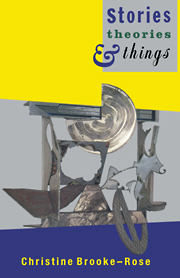Book contents
- Frontmatter
- Contents
- Preface
- Acknowledgements
- Part I Theories as stories
- Part II Stories and style
- 4 A for but: Hawthorne's ‘The Custom-House’
- 5 Ill locutions
- 6 Ill logics of irony
- 7 Ill wit and sick tragedy
- 8 Cheng Ming Chi'I'd
- 9 Notes on the metre of Auden's The Age of Anxiety
- Part III Theories of stories
- Part IV Things?
- References
- Index
5 - Ill locutions
Published online by Cambridge University Press: 20 August 2009
- Frontmatter
- Contents
- Preface
- Acknowledgements
- Part I Theories as stories
- Part II Stories and style
- 4 A for but: Hawthorne's ‘The Custom-House’
- 5 Ill locutions
- 6 Ill logics of irony
- 7 Ill wit and sick tragedy
- 8 Cheng Ming Chi'I'd
- 9 Notes on the metre of Auden's The Age of Anxiety
- Part III Theories of stories
- Part IV Things?
- References
- Index
Summary
This century seems to have relived, with greater intensity and sophistication, all the ancient quarrels, and none more than the quarrel between literature and philosophy. For although this has often taken the form of a quarrel between literature and science, basically it's the same quarrel, since ancient philosophy included science, both being searches for the truth, whereas poets, as everyone knows, told lies.
Today, however, we have been brought curiously back to that age in antiquity when philosophy could embrace not only science but politics and metaphysics and literature, even if poets lied and writing was a threat to pure thought. We seem, at any rate, much closer to those times, and notably to pre-Socratic times, than we did earlier this century when, as I suggested in Chapter 3 (30), science and poetry were still deeply opposed in a two-truths theory, one for poetry and one for science, which was only a refurbished version of the nineteenth-century two-truths theory, one for religion (a ‘higher’ truth) and one for science.
Today literary critics have apparently come out of their entrenchment and in various ways have stopped, or think they have stopped, hiding behind a higher truth. Nevertheless, they have done this by opening out onto other disciplines which are often considered scientific, or which at least claim to use scientific methods, such as psychoanalysis, sociology, linguistics, different kinds of logic or even mathematics. And all these, like philosophy, more or less still claim to seek truth. We thus have a curious double situation.
- Type
- Chapter
- Information
- Stories, Theories and Things , pp. 63 - 80Publisher: Cambridge University PressPrint publication year: 1991
- 1
- Cited by

